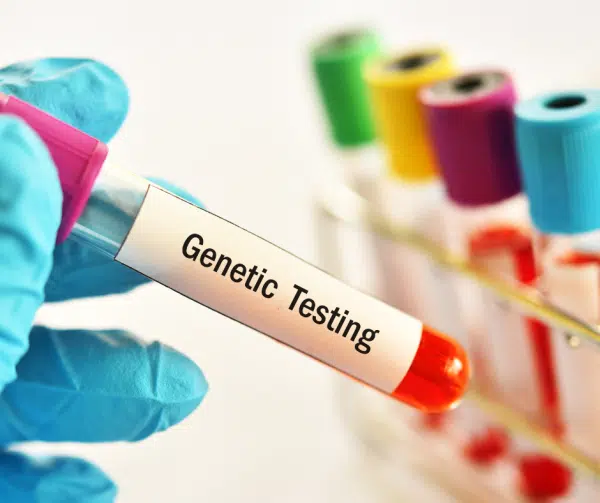Genetic Testing
Emerging Promise. Implications.
Genetic Testing and Thrombophilia
Implications
Individuals with genetic thrombophilia face an elevated risk of experiencing blood clots. Understanding one’s genetic predisposition can be crucial in implementing preventive measures and early interventions to reduce the risk of blood clots.
Diagnosing genetic thrombophilia involves a comprehensive assessment of an individual’s medical history, family history, and clinical symptoms. However, definitive diagnosis often requires genetic testing to identify specific mutations associated with thrombophilia. Common genetic tests include those for the factor V Leiden mutation, prothrombin gene mutation, protein C and protein S deficiency, and antithrombin deficiency.1
Preventive Measures, Treatment
If a person is diagnosed with genetic thrombophilia, it doesn’t mean they will experience a blood clot. Thrombophilia is a condition where the blood has an increased tendency to clot, but not everyone with this genetic predisposition will develop a clot. In fact, many people with thrombophilia may never have any clotting issues throughout their lives.
Treatment or preventive measures may not be needed or recommended for people who have not experienced a blood clot. This is because the risk of developing a blood clot is influenced by a combination of factors, including genetics, lifestyle, and other medical conditions. In some cases, the risk may be low enough that no specific intervention is recommended.
The decision to initiate treatment or preventive measures for thrombophilia is typically based on an individual’s overall risk profile, which takes into account factors such as age, medical history, family history of clotting disorders, and lifestyle factors. For example, someone with a genetic predisposition to thrombophilia who also has other risk factors, such as smoking or a history of previous blood clots, may be advised to take preventive measures, such as using anticoagulation medications or making lifestyle changes to reduce their risk.
Ultimately, the management of thrombophilia is highly individualized, and recommendations for treatment or preventive measures should be made in consultation with a healthcare provider who can assess the individual’s unique circumstances and risk factors. It’s important for individuals diagnosed with genetic thrombophilia to discuss their condition with their healthcare provider to determine the most appropriate course of action for their specific situation. The management of genetic thrombophilia involves a multifaceted approach aimed at preventing clot formation and minimizing the risk of potential complications. Key aspects of treatment and management might include:
- Anticoagulant Medications. Individuals with genetic thrombophilia may be prescribed anticoagulant medications to prevent the formation of blood clots. These medications, such as warfarin or direct oral anticoagulants (DOACs), work by inhibiting specific clotting factors.
- Lifestyle Modifications. Adopting lifestyle modifications is essential in managing genetic thrombophilia. This may include maintaining a healthy weight, regular exercise, and avoiding factors that can trigger clot formation, such as smoking and excessive alcohol consumption.
- Regular Monitoring. Individuals with genetic thrombophilia may require regular monitoring to assess their response to treatment and detect any potential complications. This monitoring often involves blood tests to evaluate clotting parameters.
Genetic testing for thrombophilia can aid in the early detection of blood clots, empowering healthcare providers to intervene proactively, leading to improved outcomes, reduced complications, and ultimately saving lives.
IMPROVED DIAGNOSIS
Genetic testing for thrombophilia can be helpful to improve blood clot diagnoses.
- Blood clots can be tricky to diagnose. Their symptoms often mimic those of other health issues, such as asthma, muscle strains, and anxiety. If a person has a known clotting disorder and can share that information with their medical team, healthcare providers gain a clearer picture when blood clot symptoms do occur — even when symptoms are ambiguous.
- Some people do not experience the most common symptoms of blood clots, while others experience no symptoms at all. This makes blood clot diagnosis even more challenging. Genetic testing can help identify individuals at risk for blood clots before symptoms appear. This proactive approach allows healthcare providers to implement preventive measures or monitor these individuals, potentially preventing complications like pulmonary embolism or stroke.
IMPROVED OUTCOMES
Genetic testing for thrombophilia can improve outcomes related to blood clots.
- When individuals are identified as having a genetic predisposition to blood clots through genetic testing, healthcare providers can help patients understand the best way to minimize their clotting risks and, importantly, to navigate other risk factors, such as contraception choice, planned pregnancies, hospitalizations or surgery.
- Early diagnosis, when symptoms of a blood clot do occur, allows for prompt initiation of appropriate therapies, such as anticoagulant medications, which can prevent the progression of blood clots and reduce the risk of complications like pulmonary embolism or stroke. By intervening at an early stage, the likelihood of severe outcomes, including disability and death, can be greatly diminished.
Genetic Testing in Women’s Health
Genetic testing for thrombophilia holds the promise of providing valuable information to inform decision-making in women’s health, particularly as it relates to contraception, pregnancy, and hormone therapy for menopause. By identifying individuals at higher risk of blood clots and implementing appropriate preventive measures and treatment strategies, the number of lives lost to blood clots in these contexts can be reduced.




To learn more about blood clots in general, click here.
To learn more about genetic testing for thrombophilia and contraception, click here.
To learn more about contraception decision-making, click here.


